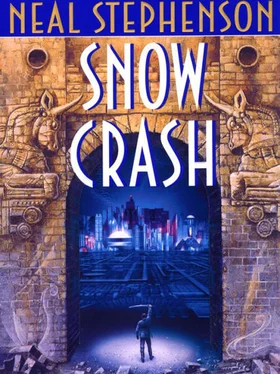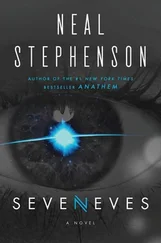Neal Stephenson - Snow Crash
Здесь есть возможность читать онлайн «Neal Stephenson - Snow Crash» весь текст электронной книги совершенно бесплатно (целиком полную версию без сокращений). В некоторых случаях можно слушать аудио, скачать через торрент в формате fb2 и присутствует краткое содержание. Жанр: Киберпанк, на английском языке. Описание произведения, (предисловие) а так же отзывы посетителей доступны на портале библиотеки ЛибКат.
- Название:Snow Crash
- Автор:
- Жанр:
- Год:неизвестен
- ISBN:нет данных
- Рейтинг книги:5 / 5. Голосов: 1
-
Избранное:Добавить в избранное
- Отзывы:
-
Ваша оценка:
- 100
- 1
- 2
- 3
- 4
- 5
Snow Crash: краткое содержание, описание и аннотация
Предлагаем к чтению аннотацию, описание, краткое содержание или предисловие (зависит от того, что написал сам автор книги «Snow Crash»). Если вы не нашли необходимую информацию о книге — напишите в комментариях, мы постараемся отыскать её.
Snow Crash — читать онлайн бесплатно полную книгу (весь текст) целиком
Ниже представлен текст книги, разбитый по страницам. Система сохранения места последней прочитанной страницы, позволяет с удобством читать онлайн бесплатно книгу «Snow Crash», без необходимости каждый раз заново искать на чём Вы остановились. Поставьте закладку, и сможете в любой момент перейти на страницу, на которой закончили чтение.
Интервал:
Закладка:
"Lagos said that Enki had the ability to ascend into the universe of language and see it before his eyes. Much as humans go into the Metaverse. That gave him power to create nam-shubs. And nam-shubs had the power to alter the functioning of the brain and of the body."
"Why isn't anyone doing this kind of thing nowadays? Why aren't there any nam-shubs in English?"
"Not all languages are the same, as Steiner points out. Some languages are better at metaphor than others. Hebrew, Aramaic, Greek, and Chinese lend themselves to word play and have achieved a lasting grip on reality: Palestine had Qiryat Sefer, the "City of the Letter," and Syria had Byblos, the "Town of the Book." By contrast other civilizations seem "speechless" or at least, as may have been the case in Egypt, not entirely cognizant of the creative and transformational powers of language. Lagos believed that Sumerian was an extraordinarily powerful language - at least it was in Sumer five thousand years ago."
"A language that lent itself to Enki's neurolinguistic hacking."
"Early linguists, as well as the Kabbalists, believed in a fictional language called the tongue of Eden, the language of Adam. It enabled all men to understand each other, to communicate without misunderstanding. It was the language of the Logos, the moment when God created the world by speaking a word. In the tongue of Eden, naming a thing was the same as creating it. To quote Steiner again, 'Our speech interposes itself between apprehension and truth like a dusty pane or warped mirror. The tongue of Eden was like a flawless glass; a light of total understanding streamed through it. Thus Babel was a second Fall.' And Isaac the Blind, an early Kabbalist, said that, to quote Gershom Scholem's translation, 'The speech of men is connected with divine speech and all language whether heavenly or human derives from one source: the Divine Name.' The practical kabbalists, the sorcerers, bore the title Ba'al Shem, meaning 'master of the divine name.'"
"The machine language of the world," Hiro says.
"Is this another analogy?"
"Computers speak machine language," Hiro says. "It's written in ones and zeroes-binary code. At the lowest level, all computers are programmed with strings of ones and zeroes. When you program in machine language, you are controlling the computer at its brainstem, the root of its existence. It's the tongue of Eden. But it's very difficult to work in machine language because you go crazy after a while, working at such a minute level. So a whole Babel of computer languages has been created for programmers: FORTRAN, BASIC, COBOL, LISP, Pascal, C, PROLOG, FORTH. You talk to the computer in one of these languages, and a piece of software called a compiler converts it into machine language. But you never can tell exactly what the compiler is doing. It doesn't always come out the way you want. Like a dusty pane or warped mirror. A really advanced hacker comes to understand the true inner workings of the machine - he sees through the language he's working in and glimpses the secret functioning of the binary code - becomes a Ba'al Shem of sorts."
"Lagos believed that the legends about the tongue of Eden were exaggerated versions of true events," the Librarian says. "These legends reflected nostalgia for a time when people spoke Sumerian, a tongue that was superior to anything that came afterward."
"Is Sumerian really that good?"
"Not as far as modern-day linguists can tell," the Librarian says. "As I mentioned, it is largely impossible for us to grasp. Lagos suspected that words worked differently in those days. If one's native tongue influences the physical structure of the developing brain, then it is fair to say that the Sumerians - who spoke a language radically different from anything in existence today - had fundamentally different brains from yours. Lagos believed that for this reason, Sumerian was a language ideally suited to the creation and propagation of viruses. That a virus, once released into Sumer, would spread rapidly and virulently, until it had infected everyone."
"Maybe Enki knew that also," Hiro says. "Maybe the nam-shub of Enki wasn't such a bad thing. Maybe Babel was the best thing that ever happened to us."
37
Y.T.'s mom works in Fedland. She has parked her little car in her own little numbered slot, for which the Feds require her to pay about ten percent of her salary (if she like it she can take a taxi or walk) and walked up several levels of a blindingly lit reinforced-concrete helix in which most of the spaces - the good spaces closer to the surface - are reserved for people other than her, but empty. She always walks up the center of the ramp, between the rows of parked cars, so that the EBGOC boys won't think she's lurking, loitering, skulking, malingering, or smoking.
Reaching the subterranean entrance of her building, she has taken all metal objects from her pockets and removed what little jewelry she's wearing and dumped them into a dirty plastic bowl and walked through the detector. Flashed her badge. Signed her name and noted down the digital time. Submitted to a frisking from an EBGOC girl. Annoying, but it sure beats a cavity search. They have a right to do a cavity search if they want. She got cavity-searched every day for a month once, right after she had spoken up at a meeting and suggested that her supervisor might be on the wrong track with a major programming project. It was punitive and vicious, she knew it was, but she always wanted to give something back to her country, and whenever you work for the Feds you just accept the fact that there's going to be some politicking. And that as a low-level person you're going to bear the brunt. And later on, you climb the GS ladder, don't have to put up with as much shit. Far be it from her to quarrel with her supervisor. Her supervisor, Marietta, doesn't have an especially stellar GS level, but she does have access. She has connections. Marietta knows people who know people. Marietta has attended cocktail parties that were also attended by some people who, well, your eyes would bug out.
She has passed the frisking with flying collars. Put the metal stuff back into her pockets. Climbed up half a dozen flights of stairs to her floor. The elevators here still work, but some very highly placed people in Fedland have let it be known - nothing official, but they have ways of letting this stuff out - that it is a duty to conserve energy. And the Feds are real serious about duty. Duty, loyalty, responsibility. The collagen that binds us into the United States of America. So the stairwells are filled with sweaty wool and clacking leather. If you took the elevator, no one would actually say anything, but it would be noticed. Noticed and written down and taken into account. People would look at you, glance you up and down, like, what happened, sprain your ankle? Taking the stairs is no problem.
Feds don't smoke. Feds generally don't overeat. The health plan is very specific, contains major incentives, get too heavy or wheezy and, no one says anything about it - which would be rude - but you feel a definite pressure, a sense of not fitting in, as you walk across the sea of desks, eyes glance up to follow you, estimating the mass of your saddlebags, eyes darting back and forth between desks as, by consensus, your co-workers say to themselves, I wonder how much he or she is driving up our health plan premiums?
So Y.T.'s mom has clacked up the stairs in her black pumps and gone into her office, actually a large room with computer workstations placed across it in a grid. Used to be divided up by partitions, but the EBGOC boys didn't like it, said what would happen if there had to be an evacuation? All those partitions would impede the free flow of unhinged panic. So no more partitions. Just workstations and chairs. Not even any desktops. Desktops encourage the use of paper, which is archaic and reflects inadequate team spirit. What is so special about your work that you have to write it down on a piece of paper that only you get to see? That you have to lock it away inside a desk? When you're working for the Feds, everything you do is the property of the United States of America. You do your work on the computer. The computer keeps a copy of everything, so that if you get sick or something, it's all there where your co-workers and supervisors can get access to it. If you want to write little notes or make phone doodles, you're perfectly free to do that at home, in your spare time.
Читать дальшеИнтервал:
Закладка:
Похожие книги на «Snow Crash»
Представляем Вашему вниманию похожие книги на «Snow Crash» списком для выбора. Мы отобрали схожую по названию и смыслу литературу в надежде предоставить читателям больше вариантов отыскать новые, интересные, ещё непрочитанные произведения.
Обсуждение, отзывы о книге «Snow Crash» и просто собственные мнения читателей. Оставьте ваши комментарии, напишите, что Вы думаете о произведении, его смысле или главных героях. Укажите что конкретно понравилось, а что нет, и почему Вы так считаете.






